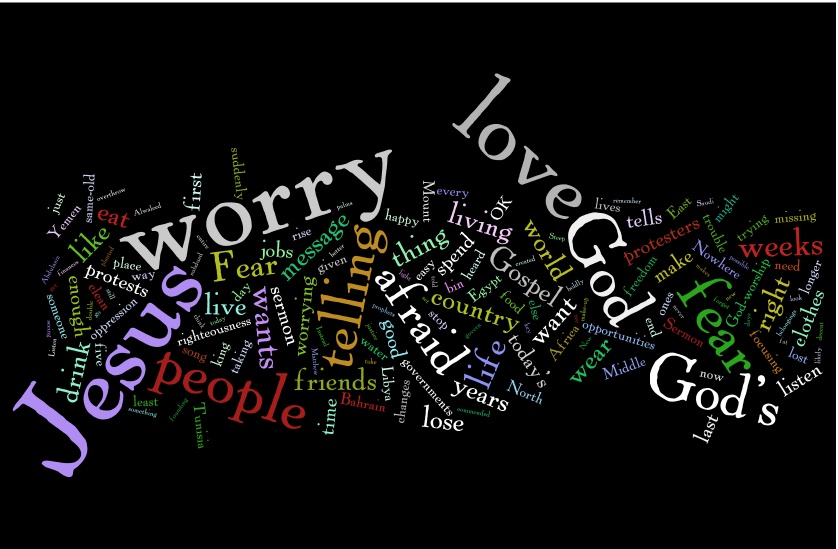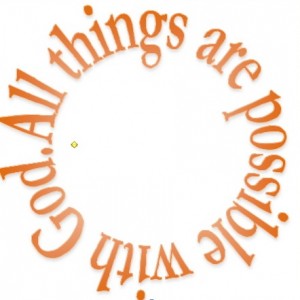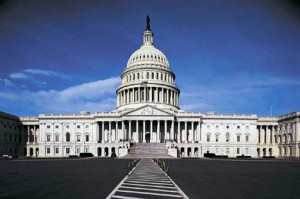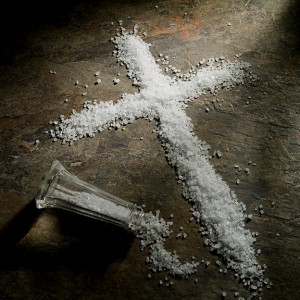For the last four weeks, the world has been transfixed by the events taking place in North Africa and the Middle East.
After 23 years in Tunisia and 31 years in Egypt, the people rose up and through mostly peaceful but still costly protests overthrew their leaders. In Libya, 42 years of oppression have brought about more protests, ones that have turned brutally violent, in an attempt to overthrow their own leader, Col. Moammar Khadafy.
overthrew their leaders. In Libya, 42 years of oppression have brought about more protests, ones that have turned brutally violent, in an attempt to overthrow their own leader, Col. Moammar Khadafy.
Protests are also taking place in Bahrain, Morocco, Yemen, Iraq, Iran, Oman and Jordan. In Syria, President Bashar al-Assad is making changes to avoid the same kind of protests. The grandson of the founding king of modern Saudi Arabia, Prince Alwaleed bin Talal bin Abdulaziz Al-Saud, acknowledged publicly – in the New York Times no less! – that changes need to happen, that the governing philosophy of same-old, same-old no longer will suffice.[1]
In each country, the people have said that they are tired of their governments ignoring them. They want, the people say, jobs, freedom, opportunities to grow. They want to govern themselves.
But none of these demands are new. The people who are changing the world aren’t suddenly being confronted by a lack of jobs, or freedom, or opportunities. Those issues have been the order of the day for decades.
So what changed?
What happened to make people who for years were oppressed and subdued suddenly rise up and topple governments that were seen as secure?
If you listen to the protesters in each country, they all say the same thing:
“We have lost our fear.”[2]
In country after country, the people were able to rise up against injustice and oppression because, they said, they had lost their fear.
• • •
My friends, for the last five weeks, we have been immersed in Jesus’ magnificent Sermon on the Mount, where he has told the people, in every way possible, that it is time for them to lose their fear.
Nowhere in this sermon does Jesus actually use those words. Nowhere does he proclaim, as angels and prophets before him have proclaimed, “Fear not!”
But a key underlying message to this sermon truly is just that: “Fear not!”
And what is Jesus telling us to not fear?
Love.
Do not be afraid … to love.
To love God and love one another.
Those blessings Jesus laid out at the beginning of this sermon, in the Beatitudes? Those were given to people who were afraid – afraid that they were not loved, and afraid in turn to love.
That saltiness and light that Jesus commended us to be? If that’s not a message of “fear not,” I don’t know what is.
 Those legalisms, all those Law-on-steroids[3] that we have heard for the last two weeks, the “you have heard that it was said … but I say to you” directions? That wasn’t Jesus trying to be more Pharisaic than the Pharisees. That was Jesus telling the people: Go beyond the Law … to love!
Those legalisms, all those Law-on-steroids[3] that we have heard for the last two weeks, the “you have heard that it was said … but I say to you” directions? That wasn’t Jesus trying to be more Pharisaic than the Pharisees. That was Jesus telling the people: Go beyond the Law … to love!
And now we come to today’s Gospel, the end of our five weeks of the Sermon on the Mount, in which Jesus tells us, “Do not worry” … about what we are to eat or drink or wear … or even about tomorrow, “for today’s trouble is enough for today.”
If we listen to this Gospel on its own, considering not that which preceded it, it would be easy to equate this message with Bobby McFerrin’s. You remember his song, right?
(sung) Don’t worry … be happy.[4]
In every life we have some trouble
When you worry you make it double
Don’t worry … be happy.
It’s a happy-go-lucky song that makes you feel good, right?
Now that I’ve planted those lyrics in your head – Don’t worry … be happy – go back and read the Gospel from Matthew again, and you can see how easy it is to think, “Why, they’re both about the same thing: ‘Don’t worry’!”
But my friends, Jesus is not telling us we should never worry … and that’s a good thing, because if he were telling us that, the truth is, most of us would not listen.
Because we do worry.
We worry about our health … our finances … our families … our friends … the economy … jobs … safety … We worry about the food we eat (“Is this good for me?”), the water we drink (“Is it clean?”), the clothes we wear (“Does this outfit make me look fat?”).
If we’re honest with ourselves, we’ll admit that on any given day, we probably spend at least a few hours of it worrying.
So when Jesus tells us, “Do not worry …” our first reaction most likely, at least in private, is, “Yeah, right …”
But if we do that, we’re missing the point.
Because he’s not telling us to worry not.
He’s telling us to lose our fear. He’s telling us to be like those protesters in Tunisia and Egypt and Bahrain and Yemen and Libya, where protesting has cost many of them their lives.
Jesus wants us to stop being afraid all the time and to start focusing on the things that really matter.
He’s telling us to “strive first for the kingdom of God and [God’s] righteousness.”
Because when we do that – when God’s justice rolls down like waters and God’s righteousness like an everflowing stream[5] — then indeed, we will not have to worry about what we are to eat or drink or wear (“Does this outfit make me look fat?”). Because in God’s very just and righteous world, all of us will have enough food to eat, clean water to drink and decent clothes to wear, for then we shall no longer live in a world where scarcity is king. Instead, we will inhabit a creation where God’s abundance reigns.[6]
Listen to how Biblical scholar Eugene Peterson has translated today’s Gospel in The Message:
If you decide for God, living a life of God-worship, it follows that you don’t fuss about what’s on the table … or whether the clothes in your closet are in fashion. … What I’m trying to do here is to get you to relax, to not be so preoccupied with getting, so you can respond to God’s giving. … Steep your life in God-reality, God-initiative, God-provisions. Don’t worry about missing out … Give your entire attention to what God is doing right now.[7]
When we spend all of our time worrying about what we have and don’t have, we are not living a life of God-worship. We’re living a life of fear.
Fear that what we have is not enough.
Fear that someone else might have more than we do, or something better than we do.
Fear that someone else might try to take away what we have.
Jesus wants us to stop being so afraid that we lose sight of what God wants for us. He wants us to set aside our fear and remember God’s promise to us: “Yet I will not forget you. See, I have inscribed you on the palms of my hand.”[8]
Jesus wants us to love – boldly … passionately … wildly … radically – the way God loves us.
When we worry … when we are afraid … when we spend our days focusing only on ourselves and our belongings, and not on God and God’s other beloved children, and what they need, we cannot love.
It’s OK to worry … we’re human beings, and worry is part of our genetic make-up.
It’s not OK to let those worries consume us, to keep us from seeing God’s abundant love in our lives – and from acting on that love, from living that love.
My friends, we are created by God to love.
We are created … by God … to love.
That’s what Jesus is saying to us: Live in love.
And if we want to live in love, if we want to live as Jesus tells us to live, not worrying but loving, the first step we have to take is become like those protesters all over the Middle East and North Africa, the ones who have inspired us and kept us glued to our TV sets for weeks on end.
First, we must lose our fear.
Then … then … we can love.
Amen.
————————————————————
A sermon preached on the Eighth Sunday after the Epiphany, 27 February 2011, Year A, at the Episcopal Church of Our Savior, Montpelier, Va.
[1] Prince Alwaleed bin Talal bin Abdulaziz Al-Saud, chairman of the Kingdom Holding Company and the Alwalaeed bin Talal Foundations, “A Saudi Prince’s Plea for Reform,” The New York Times opinion page, 25 February 2001, http://www.nytimes.com/2011/02/25/opinion/25alsaud.html?scp=2&sq=alwaleed%20bin%20talal%20bin%20abdul%20aziz%20alsaud&st=cse
[2] Sarah A. Topol, aolnews, “Egyptian protesters vow they will remain: ‘We lost our fear,’” http://www.aolnews.com/2011/02/03/egyptian-protesters-vow-they-will-remain-we-lost-our-fear/ (See also numerous other reports in February from Egypt and Bahrain.)
[3] David Lose, Marbury E. Anderson Biblical Preaching Chair, Luther Seminary, on http://www.workingpreacher.org/dear_wp.aspx?article_id=452
[4] Bobby McFerrin, Don’t Worry, Be Happy, released September 1988, lyrics from http://www.lyricsondemand.com/onehitwonders/dontworrybehappylyrics.html
[5] Amos 5:24
[6] Paraphrase from Lose, “Picture This,” at WorkingPreacher.org, http://www.workingpreacher.org/dear_wp.aspx?article_id=458.
[7] The Message (MSG), © 1993, 1994, 1995, 1996, 2000, 2001, 2002 by Eugene H. Peterson, via http://www.biblegateway.com.
[8] Isaiah 49:15b-16a.




















